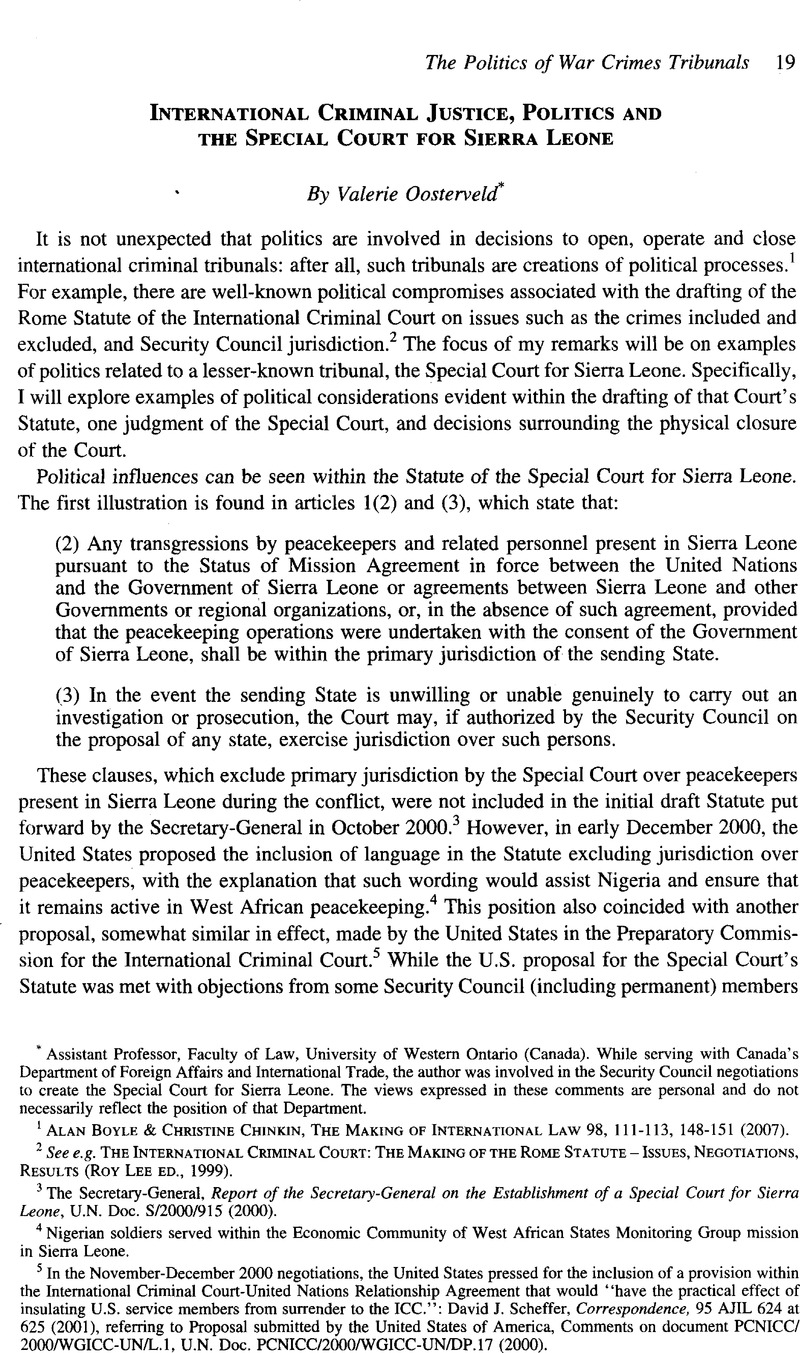No CrossRef data available.
Article contents
International Criminal Justice, Politics and the Special Court for Sierra Leone
Published online by Cambridge University Press: 28 February 2017
Abstract

- Type
- The Politics of War Crimes Tribunals
- Information
- Copyright
- Copyright © American Society of International Law 2008
References
1 Alan Boyle & Christine Chinkin, The Making of International Law 98, 111-113, 148-151 (2007).
2 See e.g. The International Criminal Court: The Making of the Rome Statute - Issues, Negotiations, Results (Roy Lee ed., 1999).
3 The Secretary-General, Report of the Secretary-General on the Establishment of a Special Court for Sierra Leone, U.N. Doc. S/2000/915 (2000).
4 Nigerian soldiers served within the Economic Community of West African States Monitoring Group mission in Sierra Leone.
5 In the November-December 2000 negotiations, the United States pressed for the inclusion of a provision within the International Criminal Court-United Nations Relationship Agreement that would “have the practical effect of insulating U.S. service members from surrender to the ICC”: Scheffer, David J. Correspondence, 95 AJIL 624 at 625 (2001)Google Scholar, referring to Proposal submitted by the United States of America, Comments on document PCNICC/2000/WGICC-UN/L.l, U.N. Doc. PCNICC/2000/WGICC-UN/DP.17 (2000).
6 The Secretary-General’s discomfort is reflected at paras, 4-6 in his Letter dated 12 January 2001 from the Secretary-General addressed to the President of the Security Council, U.N. Doc. S/2001/40 (2001).
7 Letter dated 22 December 2000 from the President of the Security Council addressed to the Secretary-General, U.N. Doc. S/2000/1234 (2000) at 1.
8 This was initially the view of the Secretary-General and the Government of Sierra Leone: supra note 3, at paras. 25-27.
9 The Secretary-General, Eleventh Report of the Secretary-General on the United Nations Mission in Sierra Leone, U.N. Doc. S/2001/857 (2001) at para. 48.
10 Schabas, William, The UN International Criminal Tribunals: The Former Yugoslavia, Rwanda and Sierra Leone 135 (2006)Google Scholar.
11 Prosecutor v. Moinina Fofana and Allieu Kondewa, Case No. SCSL-04-14-T, Judgment, Trial Chamber I, Aug. 2, 2007, at 290-292.
12 Id. at Separate Concurring and Partially Dissenting Opinion of Hon. Justice Bankole Thompson Filed Pursuant to Article 18 of the Statute, paras. 69 and 90.
13 While the majority judges disagreed with this analysis, they held that defending a just cause can be taken into account in mitigation of sentence: Judgment on the Sentencing of Moinina Fofana and Allieu Kondewa, Case No. SCSL-04-14-T, Trial Chamber I, Oct. 9, 2007, at paras. 79, 86 and 91. Both the majority and dissenting views were rejected by the Appeals Chamber: Prosecutor v. Moinina Fofana and Allieu Kondewa, Case No. SCSL-04-14-T, Judgment, Appeals Chamber, May 28, 2008, at paras. 522-534.
14 Valerie Oosterveld and Tracey Gurd, Discussion Paper, The Special Court for Sierra Leone: Options for Addressing Residual Issues after Physical Closure (Feb. 20-21, 2008) (Prepared for the Special Court for Sierra Leone Residual Issues Expert Group Meeting in Freetown, Sierra Leone, Feb. 20-21, 2008).
15 The Special Court has begun to explore these solutions: Residual Issues Expert Group Meeting, Comprehensive Report Prepared by the Special Court for Sierra Leone (Feb. 20-21, 2008).
16 One exception occurred in 2004/05, when the UN General Assembly approved a subvention for the Court.




